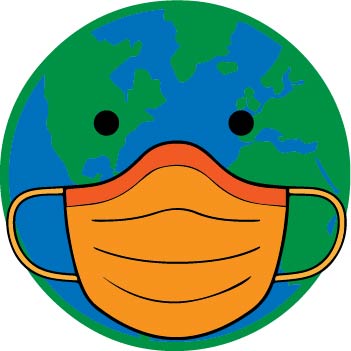Checking in around the world: how other countries are locking down?
Bridget Corcoran catches up with some of her friends worldwide to investigate their country’s responses to COVID-19
As someone who has studied abroad in Germany, backpacked through Europe, and currently maintains several friendships with people around the entire world, I was curious how my friends have been doing throughout the COVID-19 crisis.
I asked my friend, Georgia Perry from Brisbane, Australia, how her country is reacting to the virus.
“Our restrictions are a lockdown without using the word ‘lockdown’. Any forms of socializing have been banned. We are allowed to go walking with our household or one other person. In the last few days they have been eased to allow for picnics – being allowed to stay at a park, where we previously were only allowed to walk around,” Perry said.
Perry explained that she is very happy about Australia’s response to the economic crisis.
“The government brought in the JobKeeper initiative, which is a wage subsidy to businesses to keep wage costs down and keep them running. The government gives $750 per employee per week to the businesses,” Perry said.
When asked how she viewed the U.S. right now, Perry admitted that “honestly, we really only see what’s happening in New York City, and it’s painted very poorly. The picture we are being portrayed is Donald Trump and his lackluster, arrogant response,” Perry said.
I also caught up with my friend Phatsaraphon Chooduangkeaw from Ratchaburi, Thailand.
“The economy is down.” She recounted. “We have a curfew, which means that I can’t go outside of my home at 10:00 a.m. until 4:00 a.m. The airports have been closed. We limit the number of Thai people who come back to Thailand. Everyone wears masks and always uses alcohol gel,” Chooduangkeaw said.
Luca Zade, a friend of mine from South Africa, described his country’s current situation as similar to the U.S’s.
“South Africa went into lockdown on March 26th, but we had encouraged social distancing about a week before that. The hard lockdown meant no businesses could operate except essential services, and you can only leave your house to go to the shops,” Zade said.
Zade explained that they have eased regulations slightly in recent weeks. “Now you can exercise from 6:00 a.m. to 9:00 a.m.”
My former suitemate, Bodjel Gojzel from Heerenveen, Netherlands, described some measures her country is taking to enforce the lockdown.
“There is a maximum of three people together and, if not, you’ll get a €400 ticket and a criminal record. We have to wash our hands and for funerals there are no more than thirty people allowed,” Gojzel said.




